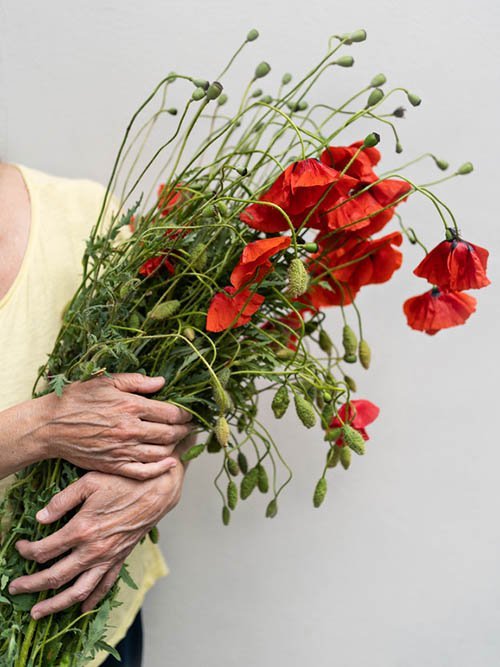
5 Holistic Healthcare Tips For Menopause, According To An OB-GYN
“Menopause is not a disease, there’s nothing wrong with you, and life is not over.”
—Dr. Anna Barbieri, Elektra Health
Technically speaking, menopause occurs when it has been 12 months since a person’s last period. While this transition occurs on a single day, perimenopause, or the transition phase before menopause, lasts an average of four years. The entire menopausal experience—from when it starts and how long it lasts to which symptoms you experience (as well as the severity)—can vary widely from person to person.
“Perimenopause, or the transition phase before menopause, lasts an average of four years.”
To better understand this life transition, we turned to Dr. Anna Barbieri, MD, FACOG, NCMP, and founding physician of Elektra Health. The virtual menopause wellness platform offers evidence-based expertise and is a great resource for understanding the basics of menopause. Elektra Health can also help you ask the right questions of your doctor and find support from others going through a similar experience.
Menopause—which Dr. Barbieri muses could be “a necessarily difficult transition because it’s what we actually need to grow into the next version of ourselves”—is both a rite of passage that connects women across history, as well as an evolving industry with many advancements, both in terms of treatment and how we talk about it today.
A Brief History of Menopause Treatment
Dr. Barbieri explains that “we have records from the 19th century about the treatment of menopause. At that time, some women were treating their menopause symptoms [with] home remedies not unlike the ones women use today, including [with] wine and cannabis.”
“Dr. Barbieri says she takes a dual-pronged approach to menopause treatment, using hormone therapies as well as a holistic approach.”
It wasn’t until the 20th century that menopause treatment entered the realm of Western medicine. Estrogen wasn’t isolated as a hormone until 1929, and it wasn’t until 1942 that hormone replacement therapy (HRT) entered the market. Fast forward to the ‘70s, when Dr. Barbieri explains, “estrogen replacement without its sister hormone, progesterone, carries an increased risk of endometrial, or uterine, cancer. Progesterone became part of standard (HRT) in the 1980s.”
While knowledge about HRT was evolving—its popularity declined in the early 2000s after a study called Women’s Health Initiative (WHI) raised concerns over breast cancer—there was a rise in interest toward more natural therapies. Today, Dr. Barbieri says she takes a dual-pronged approach to menopause treatment, using hormone therapies as well as a holistic approach.
5 Holistic Healthcare Tips For Menopause
While it’s always best to speak with your medical provider about which medical treatment(s) are best for you, Dr. Barbieri shared some of her top healthcare tips for rounding out your menopause treatment with a holistic approach.
1. Shift Your Mindset
“Menopause is not a disease, there’s nothing wrong with you, and life is not over,” Dr. Barbieri says when explaining that her first holistic tip toward treating menopause is shifting your mindset.
It’s no secret that our culture has long coveted attributes of youth like perky breasts and wrinkle-free skin. We know that these physical features change as we age, and yet we continue to uphold them as an unrealistic standard of beauty.
“See menopause as an exciting opportunity to transform your life positively.”
And the expectations go beyond beauty, too. Dr. Barbieri says, “Everyone goes through a change and yet we’re expecting ourselves to perform in all aspects of life at 50 the way we approached them at 25, and that’s impossible.”
When speaking with patients at her practice or through Elektra, Dr. Barbieri always encourages patients to first establish a more positive mindset toward menopause and to see it as an exciting “opportunity to transform your life positively.”
2. Cultivate Knowledge & Awareness
The next tip is learning to ask the right questions. In today’s healthcare system, patients get to spend so little time with their providers that it’s important to prepare for your visit and know what to ask to make the most efficient use of that tiny window.
“[Educate] yourself on the basics early—like knowing perimenopause may be a period of 10-12 years and starts when your cycles become closer together.”
Dr. Barbieri recommends educating yourself on the basics early—like knowing perimenopause may be a period of 10-12 years and starts when your cycles become closer together—so you’re not caught off guard when you begin experiencing symptoms of menopause.
“Being aware of how the transition happens normally and what to expect during it is already a powerful tool for dealing with menopause,” Dr. Barbieri explains. Some questions she recommends asking once you suspect you’re approaching perimenopause include:
What symptoms can I expect in the next couple of years?
If I begin experiencing symptoms, what can do about them on my own?
When should I reach out to a medical professional for help?
Additionally, Dr. Barbieri explains that knowing how your mom went through menopause may be helpful because there’s a genetic component to the transition. “Being aware of your medical family history is important because it may affect how we do screening, as in not just for your age group but for you as an individual.”
3. Make Lifestyle Changes
Dr. Barbieri calls this tip “clearing your plate,” or, making more room, space, and time for yourself during a transition that can really impact how you feel, physically and emotionally. “Menopause is a time for transformation,” she says. “A lot of women reevaluate their lives and without clearing the plate, we can’t do that.”
“[Make] more room, space, and time for yourself during a transition that can really impact how you feel, physically and emotionally.”
Things you may want to clear off your metaphorical plate? Toxic relationships, habits or beliefs that no longer serve you, and time sucks that get in the way of being the healthiest version of yourself.
She also means clearing your literal plate of processed, sugary food and replacing it with whole foods, including plenty of veggies, fiber, and lower refined carbohydrates. “I know it sounds boring—nutrition and movement—but it’s so true. There isn’t a magic bullet […] eating well and exercising help with mood, energy, and sleep.”
4. Consider Supplements & Integrative Medicine
As a caveat to diving all-in to alternative medicine and supplements, we can remain open-minded and discuss all courses of treatment with a medical professional.
“Remain open-minded and discuss all courses of treatment with a medical professional.”
“We need to recognize that an individual is unique, and that individual’s menopause journey, goals, preferences, and medical history will be individual,” says Dr. Barbieri. “I therefore really tailor my recommendations to each individual and they can range from lifestyle, to certain supplements, additional targeted supplements, hormone therapy, or even medications.”
She recommends exploring and asking about things like acupuncture and therapy, as well as basic supplements that can help with symptoms, like magnesium, vitamin B complex, ashwagandha, vitamin D, and melatonin.
5. Find Support & Community
As with almost every life experience, even the tough ones feel easier when you know you’re not alone—and you’re certainly not when it comes to menopause. If it feels safe, consider opening up to your loved ones about your menopause experience, and lean on friends and family members who are going through it or have come out the other side. If you don’t feel like you want to lean on your personal network, there are plenty of online communities you can join for free, including Elektra’s Meno-morphosis program that offers direct text support.
Lastly, Dr. Barbieri encourages us all to challenge the assumptions we bring to the table when it comes to menopause. “You can be a very vibrant, healthy, beautiful 50-year-old. We have to stop making the assumption that health is synonymous with youth—it’s not.”
“We all have a responsibility to shake the taboos around menopause, whether or not it’s something we’ve experienced ourselves.”
We all have a responsibility to shake the taboos around menopause, whether or not it’s something we’ve experienced ourselves. As with so many stigmas surrounding women’s health, we only harm ourselves and the people in our lives and communities when we place timelines around what we should be doing and by when.
“Whether you’re 30, 50, or 80, you can be healthy and vibrant,” Dr. Barbieri says. “And yes, beautiful. Life is for living, and with our life expectancy of 82+ years, menopause is definitely not the end.”
Megan Lierley is a writer and editor based in Northern California. She currently leads content for Cora, the women’s wellness company. On any given day, there’s a good chance she’s talking tampons, practicing yoga, writing her weekly culture and current events newsletter, reading a historical fiction novel, or eating a burrito in Dolores Park.




